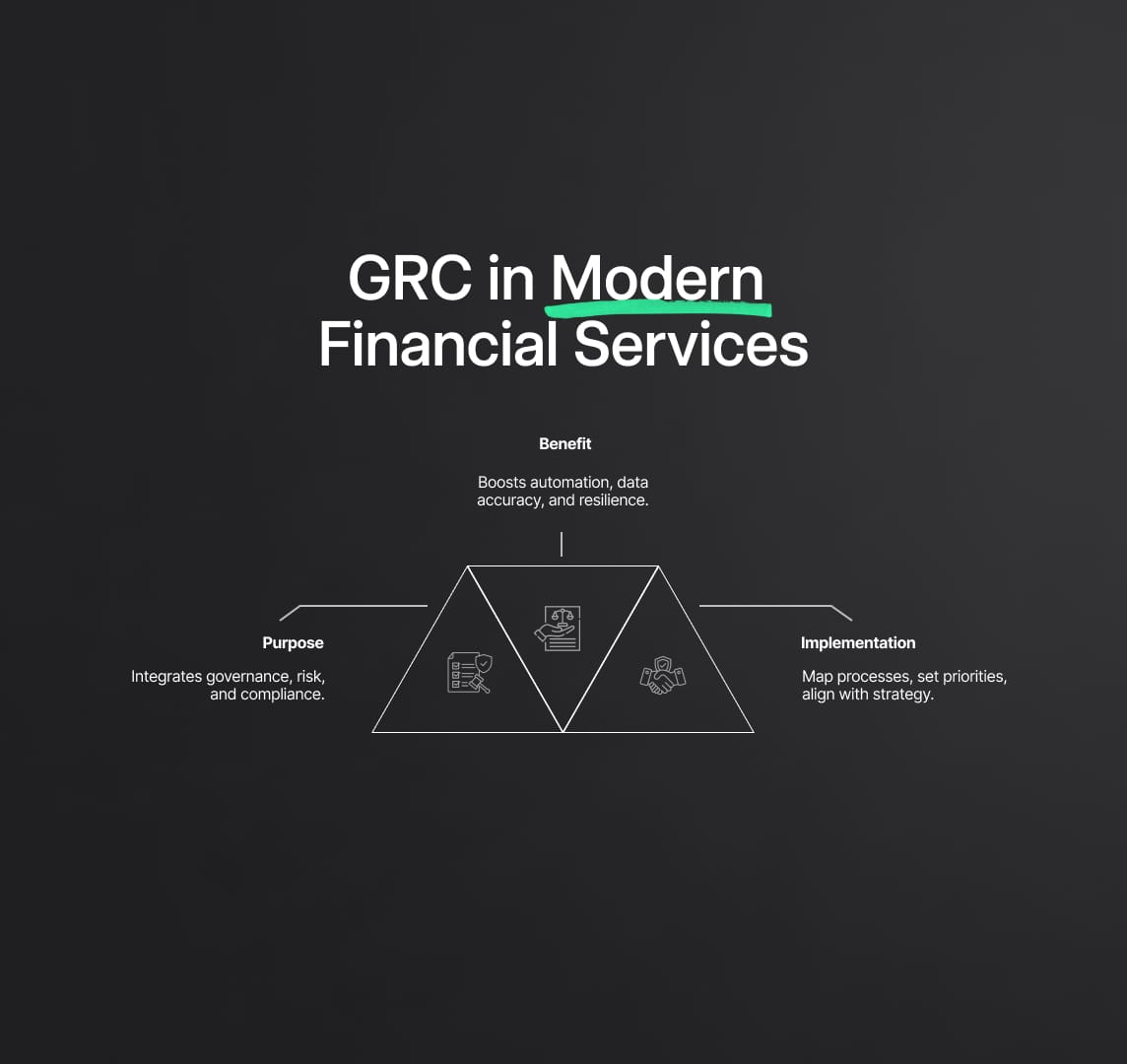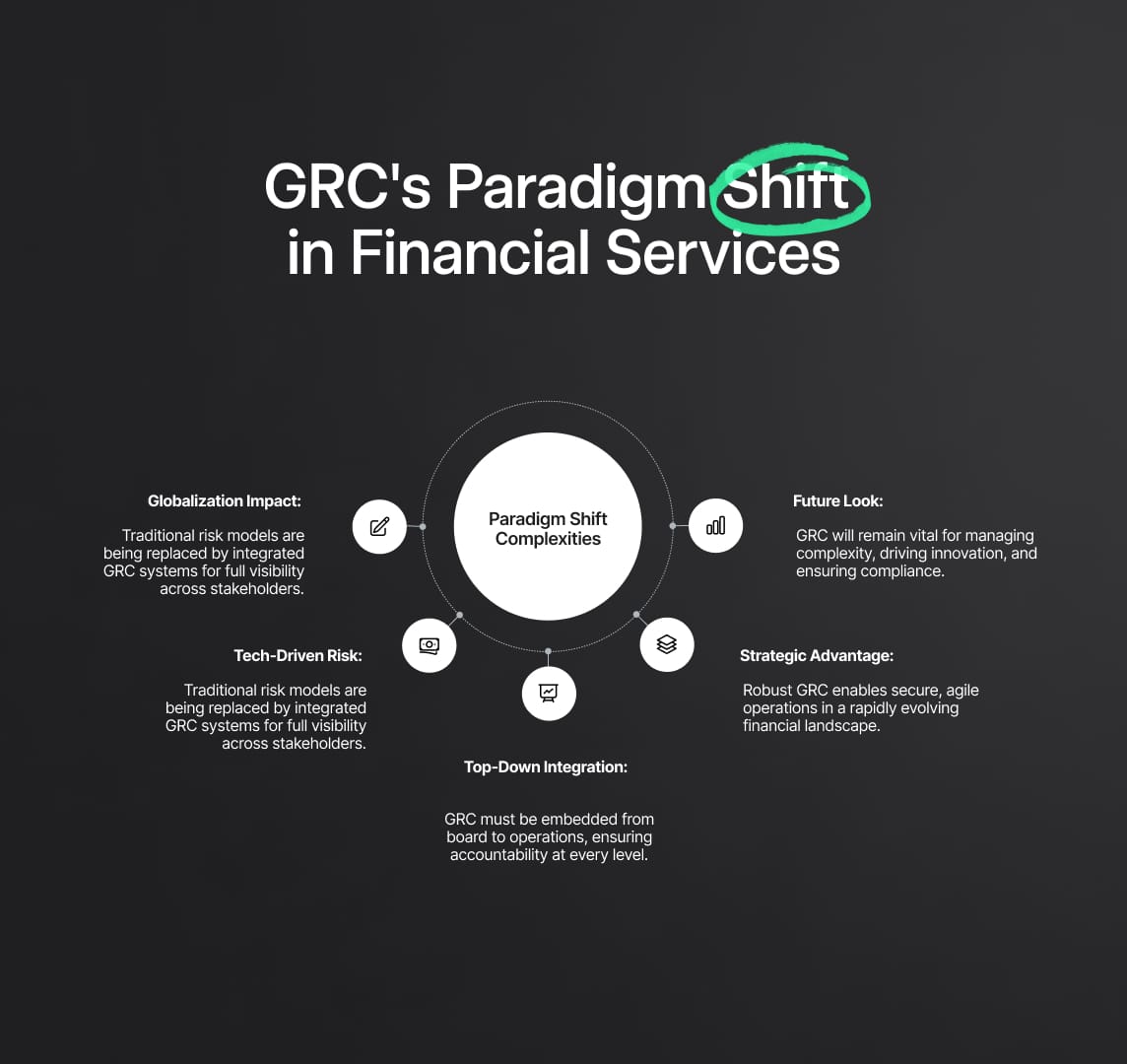GRC: How Financial Services can be Affected?
issteps in governance can prompt operational issues and potential legal complexities, affecting a company's standing and profit margins. Moreover, certain risks, such as cybersecurity, can erode customer confidence and lead to financial setbacks.

Grand “Answer”:
Financial services can be significantly impacted by Governance, Risk, and Compliance (GRC) issues. Poor governance can lead to operational inefficiencies and potential legal repercussions, which can affect a financial institution's profitability and reputation [1]. Risks, particularly in areas like cybersecurity, can result in financial losses and erosion of customer trust [2]. Non-compliance with regulatory standards can lead to penalties, sanctions, and can even jeopardize the institution's license to operate [3]. Hence, an effective GRC strategy is crucial for the health and sustainability of financial services institutions.
Source
[1]


GRC in Modern Financial Services
GRC (Governance, Risk, and Compliance) serves as the fundamental linchpin in the complex machinery of today's business environment. This importance is particularly prominent within the sphere of financial services, an industry fraught with constant evolution and intricate operational demands. By integrating three critical principles - corporate governance, risk, and compliance - GRC offers a comprehensive management model that seeks to embed these components into an organization's operational fabric seamlessly.
The intrinsic value of GRC lies in its ability to cultivate an environment that encourages ethical conduct, promotes transparency, and stimulates operational efficiency. By enforcing a single, unified approach, it serves as a vital blueprint for companies to navigate the complex labyrinth of modern business processes. The practical implications of such a unified approach include:
- Acceleration of process automation, thereby driving operational efficiency.
- Facilitating accurate data capture and processing, ensuring the integrity of critical business information.
- Fuelling value creation by optimizing the interplay between governance, risk, and compliance.
The successful implementation of a GRC model can pave the way for enhanced data accuracy and improved traceability of business processes, consequently bolstering an organization's resilience in the face of potential operational mishaps.
In the first stages of GRC implementation, a preliminary evaluation of the organization's existing operational framework is essential. This involves a comprehensive mapping of the business's processes and an assessment of its maturity levels, thereby allowing companies to prioritize processes that require immediate implementation.
The subsequent phase involves clearly defining the scope of the GRC project, outlining the objectives, and setting a realistic timeline for implementation. For sustainable success and long-term viability, these objectives must closely align with the company's strategic growth trajectory.
GRC: Technological Trends and Evolution
With the GRC blueprint in place, organizations then focus on the procurement of a specialized GRC tool that aligns with their specific needs. This tool should facilitate the automation and centralization of data concerning the organization's identified areas of interest, thereby serving as a central hub for all GRC-related activities.
The final phase of GRC implementation revolves around constant monitoring and continuous improvement. By ensuring all processes and teams are consistently under scrutiny for potential enhancements and refinement, organizations can maintain a dynamic and responsive GRC framework.
GRC can be broadly classified into four main domains:
- Audit Management: Ensures that the organization complies with external audit requirements while also fostering internal audit capabilities.
- Policy Management: Streamlines the lifecycle of policies and ensures all business processes adhere to organizational standards.
- Compliance Management: Ensures conformity with legal, industry, and organizational standards to minimize risk of penalties and reputational damage.
- Risk Management: Identifies and mitigates risks associated with an organization's strategic and operational objectives.
When considered collectively, these facets form a robust, efficient, and regulation-compliant GRC framework that enhances an organization's strategic and operational effectiveness.
In this era of rapid technological advancements, the adaptability of GRC management becomes a crucial determinant of its continued relevance and effectiveness. Key trends expected to shape the evolution of GRC include enhanced technological tools for swift incident detection, increased focus on data acquisition and management, and a drive towards interconnectedness in Risk Management.

GRC in Financial Services: A Paradigm Shift Towards Secure Future
In an increasingly globalized business ecosystem encompassing an intricate network of stakeholders - suppliers, partners, vendors, regulators, and customers - the traditional model of isolated risk programs is gradually giving way to a more integrated, dynamic approach. The shift towards this interconnected framework necessitates a GRC platform that offers a comprehensive view of the organization's risk, incident, and response records. By enabling full visibility into these crucial areas, organizations can predict risks and seize opportunities with greater accuracy and confidence.
In the financial services sector, which is characterized by its rapid technological innovations and diverse range of products and services, the role of GRC becomes even more critical. The proliferation of digital banking and fintech solutions has led to a surge in technology-related risks, necessitating robust risk mitigation measures. Consequently, regulators increasingly mandate that financial institutions have such measures in place.
To navigate these complexities, financial institutions must embed resilient GRC mechanisms at every level of their organization. Commencing at the board and executive level, GRC implementation needs to permeate through all strategic and tactical levels, integrating accountability at each stage. This integrative approach, coupled with a commitment to continuous improvement, can empower financial services companies to operate within their markets more securely and effectively, thus enabling them to flourish amidst the industry's ever-evolving demands.
The advent of GRC has served as a transformative catalyst in the realm of financial services, enabling organizations to not just keep pace with, but effectively leverage the shifting sands of technological evolution, regulatory changes, and consumer expectations. By developing and implementing robust GRC mechanisms, financial service companies can ensure their long-term success while enhancing their reputation as trustworthy and compliant entities within the dynamic global marketplace. Therefore, as the financial services landscape continues to evolve, the role of GRC will only continue to expand, serving as a critical enabler of growth, innovation, and operational resilience in the face of ever-increasing complexity.
Grand Answer: Your AI Partner
Designed to support compliance officers, legal counsels, and other professionals responsible for adhering to regulatory standards, Grand Answer aims to facilitate an efficient and straightforward compliance process.
Reduce your
compliance risks


